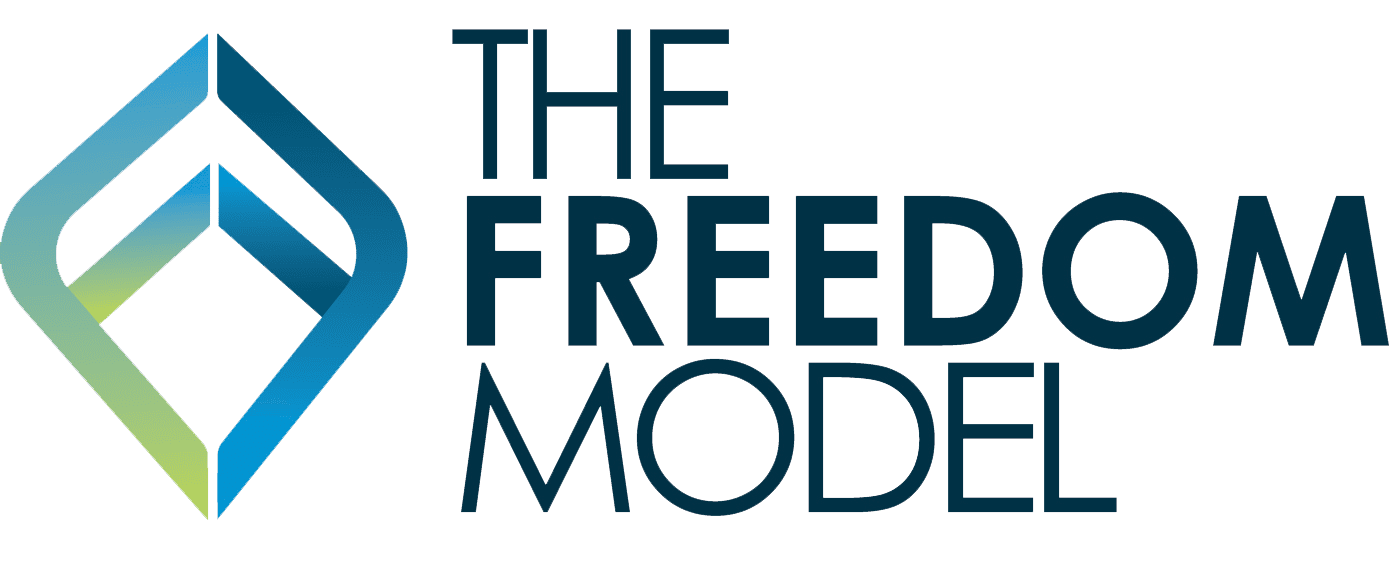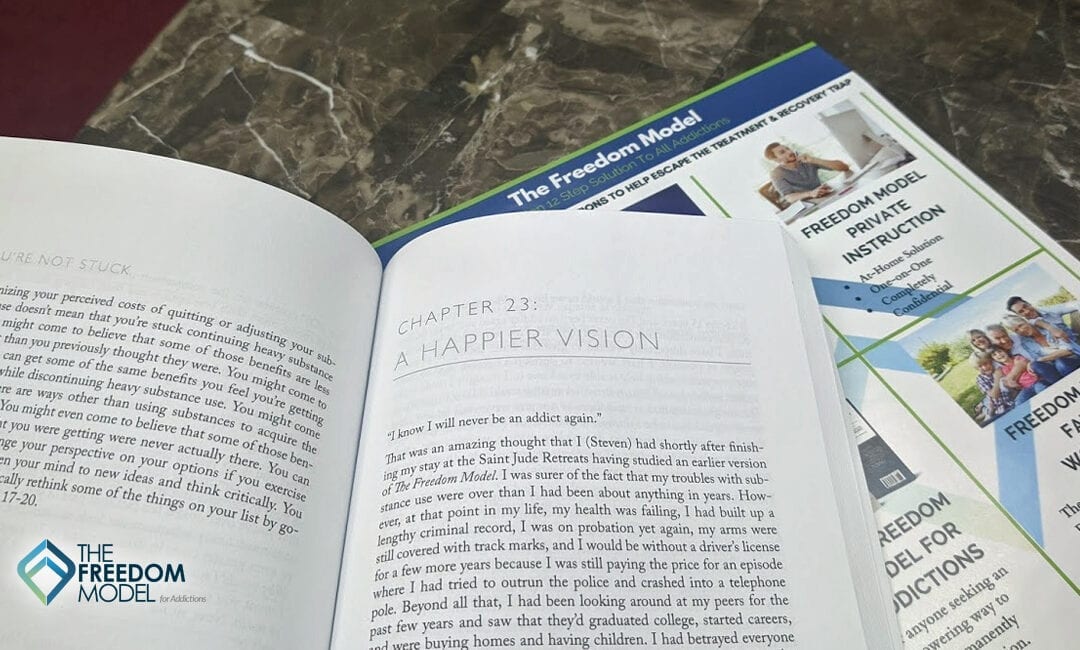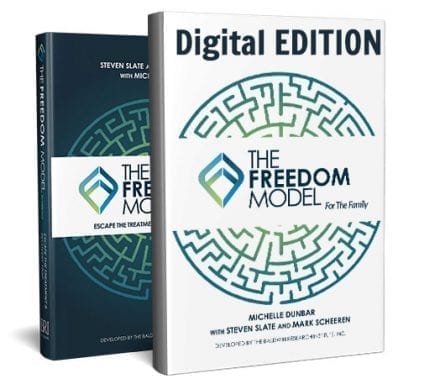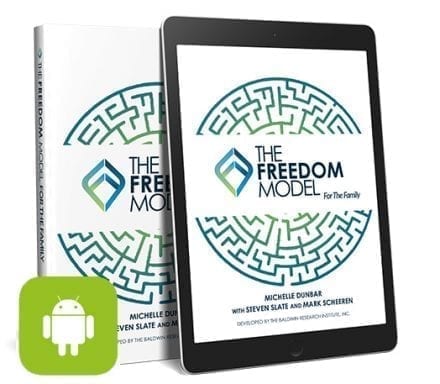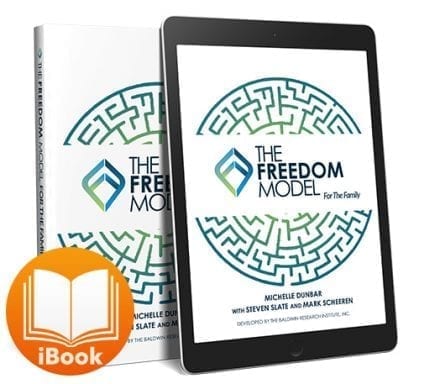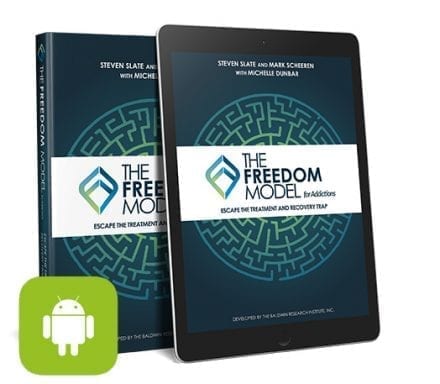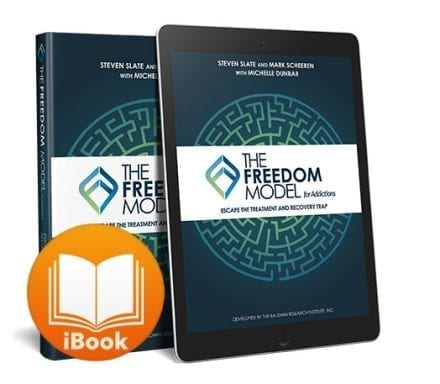The following excerpt is from The Freedom Model For Addictions, Chapter 23, A Happier Vision.
“I know I will never be an addict again.”
That was an amazing thought that I (Steven Slate) had shortly after finishing my stay at the Saint Jude Retreat, having studied an earlier version of The Freedom Model. I was more sure of the fact that my troubles with substance use were over than I had been about anything in years. However, at that point in my life my health was failing, I had built up a lengthy criminal record, I was on probation yet again, my arms were still covered with track marks, and I would be without a driver’s license for a few more years as I was still paying the price for an episode where I had tried to outrun the police and crashed into a telephone pole. Beyond all that, I had been looking around at my peers for the past few years and saw that they’d graduated college, started careers, and were buying homes and having children. I had betrayed everyone in my family; and I was generally a goofball (and still am) who must’ve appeared unstable to everyone around me. I had sobered up for short periods in the past, and I’m sure many people thought this would be yet another temporary stop on my way to total self-destruction. Yet I knew different. I knew I would never be an addict again, and knowing this felt great.
I hadn’t even totally sworn off drugs and alcohol forever. The deal I had made with myself was that I would just take a year break from substance use and make a genuine effort to see if I could be happier without using substances. This deal was broken very early on with a few single instances of substance use. I used marijuana once, I used heroin once, and used alcohol once, all within 2 or 3 months after arriving at the retreat. However, since I no longer believed in addiction or relapse, those were now seen as just choices, isolated incidents, and were really cases of me testing the waters. Each of those instances confirmed that substance use was only a mild amusement, but no longer what I wanted to be focused on in my life. They either led to or strengthened my conviction that I would never be an addict again.
It’s been 15 years (2017), and I’ve never been an addict again, and never doubted that conviction that I reached right after my retreat stay. Since that time, I have desperately wanted to give this same feeling to as many people as possible. I have wanted to develop a surefire way to make sure everyone seeking help is able to achieve it. I thought I could make a clear path – a set of steps even – that anyone could follow to get there. The tough realization is that there is not and never will be any clear set of steps that can be followed to get there. It’s more intangible than that, because it’s a realization. It isn’t like dieting, working out, cooking dinner, learning a trade, or getting a college degree. There is no set path. It’s a personal discovery and realization. It’s a change of mind.”
Steve’s story is important, because it demonstrates that a change of mind is all that is necessary to move past an addiction. This isn’t a dismissive statement, as many changes of mind don’t come easy. There might be a lot of deliberating and even some confusion. Think of getting over an addiction with a change of mind as a similar situation to say, leaving a 20 year marriage. People stay in tough, even tragically abusive marriages for years, sometimes decades before they change their minds and leave for good. Much like a relationship with drugs or alcohol that erodes the user’s life, in many cases the abused spouse stays in the marriage and then wonders why they stay. They are depressed, confused, and hang onto the belief that “a little love” makes it all worth it. To them, the benefits outweigh the pain, or they stay out of fear. To the outside observer, this seems illogical and maybe even a little crazy. Yet, the spouse doesn’t see it this way – until they do, and they move on.
Sometimes a problem that has existed for a lifetime changes in a single moment. We’ve all seen it. Suddenly, the divorce happens, a change of career comes out of the blue, the lifelong drinker just stops and moves on. What happened? All of these people had a change of perspective and the benefits of staying put were less than the benefits of making the change. The deliberating was the hard part. Staying in the bad marriage may have been awful, but the perceived benefits of staying outweighed the pain, and so they waffled in limbo.
Then they had an emotional shift; they began thinking they could be happier making the change. This emotional shift brings about a natural desire to leave. It’s no different with drugs and alcohol. You might deliberate for years, and then the drive to see happiness in abstaining or moderating becomes crystalized. There isn’t a need for willpower at this moment – you just know that changing your habit is what you truly want. At that point, it becomes easy to change, but getting to that crystalized point is the tough part. There is so much misinformation that clouds the decision making moment: the disease charade; the coerced treatment stays; the 12 step dogma and cult tactics; bad therapists; the list could go on and on. Wipe all that away and your left with one thing – can I be happier to moderate or abstain? Forget consequences and costs, just focus on the benefits of change like you would leaving a bad marriage, and all the deliberating can end and the change can happen.
If you are ready to make this shift, but you’re struggling with all the recovery society misinformation that clouds your decision making, then read The Freedom Model for Addictions, Escape the Treatment and Recovery Trap. You can get your copy at www.thefreedommodel.org. Or call us for help at 888-424-2626. We are here to help you make those crucial, lifesaving decisions and find the freedom you desire.
